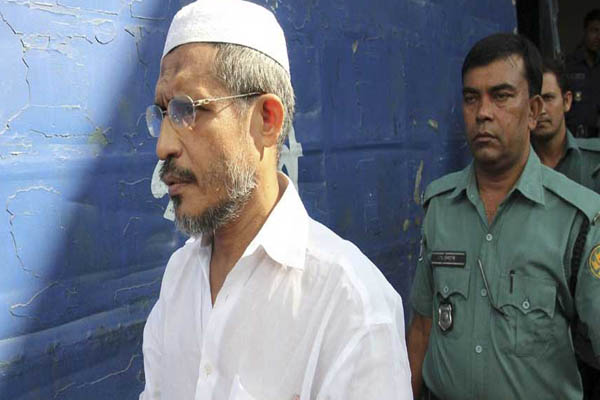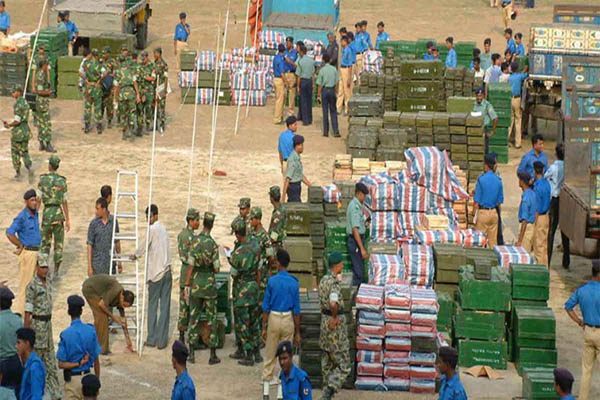 The Bangladesh High Court’s verdict to acquit Lutfozzaman Babar, former state minister for home affairs, in the infamous 10-truck arms haul case of 2004 carries significant implications for regional security for India, particularly for North East India and West Bengal. Delivered by Justice Mostafa Zaman Islam and Justice Nasrin Akhter, the verdict removes all legal barriers to Babar’s release from prison, where he had been serving a life sentence under the Arms Act. Babar, a senior leader of the Bangladesh Nationalist Party (BNP), was initially sentenced to death in 2014, along with 13 others, by a Chattogram tribunal for their involvement in one of the largest arms smuggling operations in South Asia.
The Bangladesh High Court’s verdict to acquit Lutfozzaman Babar, former state minister for home affairs, in the infamous 10-truck arms haul case of 2004 carries significant implications for regional security for India, particularly for North East India and West Bengal. Delivered by Justice Mostafa Zaman Islam and Justice Nasrin Akhter, the verdict removes all legal barriers to Babar’s release from prison, where he had been serving a life sentence under the Arms Act. Babar, a senior leader of the Bangladesh Nationalist Party (BNP), was initially sentenced to death in 2014, along with 13 others, by a Chattogram tribunal for their involvement in one of the largest arms smuggling operations in South Asia.
The court also acquitted four other high-profile individuals, including Maj Gen (retd) Rezzakul Haider Chowdhury, a former director general of Bangladesh’s National Security Intelligence (NSI), and senior officials from Chittagong Urea Fertiliser Limited (CUFL). These individuals were accused of facilitating the smuggling of a massive arms consignment intercepted on April 1, 2004, at the CUFL jetty in Chattogram. Security forces seized nearly 5,000 firearms, 27,000 grenades, 840 rocket launchers, and over 1.1 million rounds of ammunition. The weapons were destined for the United Liberation Front of Assam (ULFA), a banned separatist group in India, with the aim of intensifying insurgency and destabilizing the Indian state of Assam.
Investigations at the time revealed a well-coordinated conspiracy involving elements within Bangladesh’s state apparatus. The arms shipment exposed how militant groups like ULFA leveraged cross-border networks to sustain their separatist agenda. The Chattogram tribunal’s 2014 ruling sought to deliver justice by sentencing 14 individuals, including Babar, to death for their roles in the conspiracy. However, the High Court’s recent decision overturned many of these convictions, citing flawed investigations and lack of credible evidence. The judgment also reduced the penalties for other accused, including commuting the death sentence of ULFA military chief Paresh Baruah to life imprisonment in December 2023.
India’s security establishment is deeply concerned about the implications of this development. The 2004 arms haul was not just an isolated act of smuggling but a calculated attempt to undermine India’s territorial integrity and escalate insurgent violence in its northeastern region. The subsequent investigations revealed the transnational dimensions of the plot, implicating actors within Bangladesh who were complicit in facilitating ULFA’s anti-India agenda.
 The acquittals raise questions about the commitment to addressing cross-border militancy and ensuring accountability for actions that threaten regional stability. India has long emphasized the importance of strong bilateral cooperation with Bangladesh to combat terrorism and insurgency. While relations between the two nations had significantly improved in recent years, especially under Prime Minister Sheikh Hasina’s leadership, this relation has taken a nose dive after August 5 this year and assumption of power in Dhaka by Mohammad Yunus. While under Yunus several Islamic radicals, known terrorists were released there were also open bonhomie of the Bangladesh governemnt with the anti-Indian forces who are expressedly inclined towards Pakistan and anti Bangladesh Liberation. Now the acquittal of the key conspirators of 2004 weapons smuggling serves as a stark reminder of the challenges posed by them for India, especially North East/. For India, the verdict underscores the need for vigilance and proactive engagement with its neighbors to neutralize security challenges stemming from cross-border militancy. The acquittal of individuals linked to such a high-stakes case not only raises questions about the judicial process but also highlights the urgent need for regional solidarity in addressing security threats that transcend borders.
The acquittals raise questions about the commitment to addressing cross-border militancy and ensuring accountability for actions that threaten regional stability. India has long emphasized the importance of strong bilateral cooperation with Bangladesh to combat terrorism and insurgency. While relations between the two nations had significantly improved in recent years, especially under Prime Minister Sheikh Hasina’s leadership, this relation has taken a nose dive after August 5 this year and assumption of power in Dhaka by Mohammad Yunus. While under Yunus several Islamic radicals, known terrorists were released there were also open bonhomie of the Bangladesh governemnt with the anti-Indian forces who are expressedly inclined towards Pakistan and anti Bangladesh Liberation. Now the acquittal of the key conspirators of 2004 weapons smuggling serves as a stark reminder of the challenges posed by them for India, especially North East/. For India, the verdict underscores the need for vigilance and proactive engagement with its neighbors to neutralize security challenges stemming from cross-border militancy. The acquittal of individuals linked to such a high-stakes case not only raises questions about the judicial process but also highlights the urgent need for regional solidarity in addressing security threats that transcend borders.
(Paresh Barua)
 Pics taken from open sources, Internet
Pics taken from open sources, Internet





